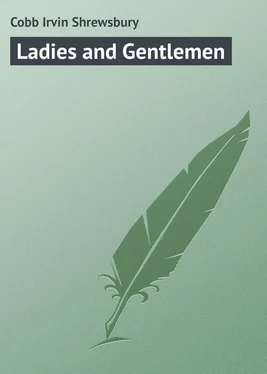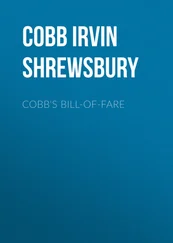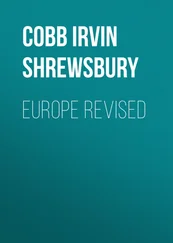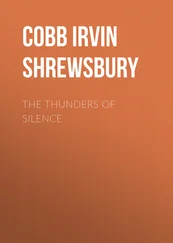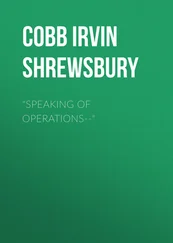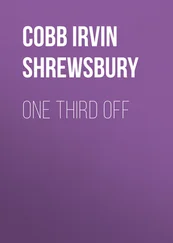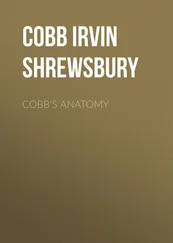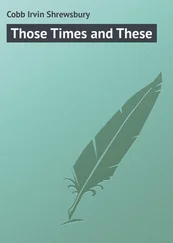Irvin Cobb - Ladies and Gentlemen
Здесь есть возможность читать онлайн «Irvin Cobb - Ladies and Gentlemen» — ознакомительный отрывок электронной книги совершенно бесплатно, а после прочтения отрывка купить полную версию. В некоторых случаях можно слушать аудио, скачать через торрент в формате fb2 и присутствует краткое содержание. Жанр: foreign_prose, на английском языке. Описание произведения, (предисловие) а так же отзывы посетителей доступны на портале библиотеки ЛибКат.
- Название:Ladies and Gentlemen
- Автор:
- Жанр:
- Год:неизвестен
- ISBN:нет данных
- Рейтинг книги:4 / 5. Голосов: 1
-
Избранное:Добавить в избранное
- Отзывы:
-
Ваша оценка:
- 80
- 1
- 2
- 3
- 4
- 5
Ladies and Gentlemen: краткое содержание, описание и аннотация
Предлагаем к чтению аннотацию, описание, краткое содержание или предисловие (зависит от того, что написал сам автор книги «Ladies and Gentlemen»). Если вы не нашли необходимую информацию о книге — напишите в комментариях, мы постараемся отыскать её.
Ladies and Gentlemen — читать онлайн ознакомительный отрывок
Ниже представлен текст книги, разбитый по страницам. Система сохранения места последней прочитанной страницы, позволяет с удобством читать онлайн бесплатно книгу «Ladies and Gentlemen», без необходимости каждый раз заново искать на чём Вы остановились. Поставьте закладку, и сможете в любой момент перейти на страницу, на которой закончили чтение.
Интервал:
Закладка:
“Perhaps the slavey – ” began Mr. Braid.
“Ollie, for heaven’s sake hush!” snapped Mrs. Gridley. “I warn you my nerves can’t stand much more tonight. They’re still up out in the kitchen – and suppose Delia heard you. It’s a blessing she didn’t hear him this afternoon.”
“I wonder if he thinks I’m going to shine ’em?” inquired Mr. Gridley, his tone plaintive, querulous, protesting. He strengthened himself with a resolution: “Well, I’m not! Here’s one worm that’s beginning to turn.”
“There’s Ditto,” speculated Mrs. Gridley. “I wouldn’t dare suggest such a thing to either of those other two. But maybe possibly Ditto – ”
“Never, except over my dead body,” declared Mr. Braid. “I’d as soon ask His Grace the Archbishop of Canterbury to press my pants for me. Fie, for shame, Dumplings!”
“But who – ”
“I, gallant Jack Harkaway the volunteer fireman,” proclaimed Mr. Braid. “I, Michael Strogoff the Courier of the Czar – I’ll shine his doggone shoes – I mean, his doggone boots. I’ll slip up and get ’em now. There’s a brush and some polish out back somewheres. Only, by rights, I should have some of the genuine Day & Martin to do it with. And I ought to whistle through my teeth. In Dickens they always whistled through their teeth, cleaning shoes.”
“Well, for one, I’m going to take a couple of aspirin tablets and go straight to bed,” said Mrs. Gridley. “Thank goodness for one thing, anyway – it’s just coming down in bucketsful outside!”
On the porch top in the darkness, Mr. Boyce-Upchurch gasped anew but happily. The last of the lather coursed in rivulets down his legs; his grateful pores opened widely and he outstretched his arms, the better to let the soothing cloudburst from on high strike upon his expanded chest.
On the sudsy underfooting his bare soles slipped – first one sole began to slip, then the other began to slip. He gasped once more, but with a different inflection. His spread hands grasped frantically and closed on the void. Involuntarily he sat down, painfully and with great violence. He began to slide: he began to slide faster: he kept on sliding. His curved fingers, still clutching, skittered over stark metal surfaces as he picked up speed. He slid thence, offbound and slantwise, toward the edge. He gave one low muffled cry. He slid faster yet. He slid across the spouting gutter, over the verge, on, out, down, into swallowing space.
Out in the service ell the last of the wastage from the Gridleys’ dinner party was being disposed of and the place tidied up against the next gustatory event in this house, which would be breakfast. Along the connecting passage from his butler’s pantry where he racked up tableware, Ditto was speaking rearward to the two occupants of the kitchen. He had been speaking practically without cessation for twenty minutes. With the h’s it would have taken longer – probably twenty-two to twenty-four minutes.
He was speaking of the habits, customs, and general excellencies of the British upper classes among whom the greater part of his active life congenially had been spent. He was approaching a specific illustration in support and confirmation of his thesis. He reached it:
“Now, you tyke Mr. Boyce-Upchurch, now. Wot pride of bearin’ ’e’s got! Wot control! Wot a flow of language when the spirit moves ’im! Always the marster of any situation – that’s ’im all oaver. Never losin’ ’is ’ead. Never jostled out of ’is stride. Never lackin’ for a word. Stock of the old bull-dog – that’s wot it is!”
Where he stood, so discouraging, he could not see Norah. Perhaps it was just as well he could not see her. For a spell was lifting from Norah. If there is such a word as ‘unenglamored’ then ‘unenglamored’ is the proper word for describing what Norah rapidly was becoming.
From Delia the tattle-tale, Norah had but just now heard whispered things. She was sitting at ease, resting after an arduous spell of labors, but about her were signs and portents – small repressed signs but withal significant. The lips tightly were compressed; one toe tapped the floor with an ominous little tattoo; through the clenched teeth she made a low steady wasp-like humming noise; in the eyes smoldered and kindled a hostile bale. It was plain that before long Norah would herself be moved to utterance. She did but bide her time.
However, as stated, Ditto could not see. He proceeded to carry on:
“No nonsense abaht ’im, I tell you. Knows wot ’e wants and speaks up and arsks for it, stryte out.”
Several of Mrs. Gridley’s specimen rose bushes served somewhat to break the force of Mr. Boyce-Upchurch’s crash, though their intertwining barbed fronds sorely scratched him here and there as he plunged through to earth. He struck broadside in something soft and gelatinous. Dazed and shaken, he somehow got upon his feet and first he disentangled himself from the crushed-down thorny covert and then he felt himself all over to make sure no important bones were broken.
Very naturally, the thought next uppermost with him, springing forward in his mind through a swirl of confused emotions, was to reenter the house and return, without detection, to his room. He darted up the front porch steps and tried the front door. It was barred fast. He tried the windows giving upon the porch; their blinds were drawn, latched from within.
Out again in the storm he half circled the main body of the house, fumbling in the cloaking blackness at yet more snugly fastened windows. An unbelievable, an appalling, an incredible conviction began to fasten its horrid talons upon Mr. Boyce-Upchurch. He could not get in without arousing someone and certainly in this, his present state, he dare not arouse anyone in order to get in. Yet he must get in. Desperation, verging already on despair, mounted in his swirling brain.
Past a jog in the side wall he saw, thirty feet on beyond and patterning through some lattice-work, a foggy shaft of light from a rain-washed window. As cautiously he moved toward it a taut obstacle in the nature of a cord or small hawser rasped him just under the nose and, shrinking back, he was aware of a ghostly white article swinging gently within arm-reach of him. Partly by touch, partly by sight, he made out its texture – woven linen or cotton cloth, limp and clammy with wetness – and he made out its contours; divined likewise its customary purposes. At home a few old-fashioned ladies still were addicts; he recognized the pattern; he had an elderly maiden aunt. In emergency it would provide partial covering – of a sort. Most surely this was an emergency. And yet —
As he hesitated, with tentative fingers still pawing the sopping shape of it, and torn between a great loathing and a great and compelling temptation, the sound of a human voice penetrated the clapboards alongside him and caused him to cower down close.
“Doggone it!”
Mr. Braid, bearing in one hand a brace of varnished boots of Regent Street manufacture, tumbled over a sharp-cornered object in the inky darkness of the cuddy behind the living-room and barked his shins, and his cry was wrung with anguish.
“Doggone it!” he repeated. “Who’s gone and hid the infernal electric light in this infernal Mammoth Cave of a storeroom? And where in thunder is that box of polish and that blacking brush? I’m sure I saw ’em here the other day on one of these dad-blamed shelves. Ouch!”
His exploring arm had brought what from weight and impact might have been an iron crowbar to clatter down upon his shoulders. As a matter of fact, it was the discarded handle of a patent detachable mop.
“Oh, damn!” soliloquized Mr. Braid. “Everything else in the condemned world is here but what I’m after. And I haven’t got any matches and I can’t find the light bulb. Maybe Norah or Delia ’ll know.”
Читать дальшеИнтервал:
Закладка:
Похожие книги на «Ladies and Gentlemen»
Представляем Вашему вниманию похожие книги на «Ladies and Gentlemen» списком для выбора. Мы отобрали схожую по названию и смыслу литературу в надежде предоставить читателям больше вариантов отыскать новые, интересные, ещё непрочитанные произведения.
Обсуждение, отзывы о книге «Ladies and Gentlemen» и просто собственные мнения читателей. Оставьте ваши комментарии, напишите, что Вы думаете о произведении, его смысле или главных героях. Укажите что конкретно понравилось, а что нет, и почему Вы так считаете.
